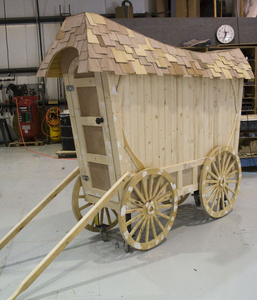

Designing and creating sets and props by Barter Theatre for Wizard of Oz included the construction of Professor Marvel's Wagon.
Tools & Techniques
Could you elaborate a little more about the "tools and techniques" of the trade. For example: How do actors learn to protect their vocal chords? How do they make sure they get sufficient rest? What happens if somebody gets too sick to go on?
• Vocal technique, including learning to sing so that you don't harm your vocal apparatus, is a learned skill. The same is true when someone has to "scream" in a show, which happens not infrequently in the theatre. There are ways to "scream" in which you can do it over and over and over again and never tire your vocal chords. Just as someone running a marathon for the first time will tire out in the first couple of miles and not be able to go on because they are not in shape, do not know how to pace themselves, and do not have the technique and training, so, too, untrained singers will tire and potentially damage their voices if they sing too much or too high or too loud without the proper training. You don't protect your vocal chords any more than runners protect their leg muscles. It's more a matter of knowing how to use those muscles properly.
The exception to the above can be singing a rock musical like Rent, where you really might be pushing the outer boundaries of what human vocal chords can do every day. There have been reports of the actors in the Broadway production of Rent losing their voices over time or doing permanent damage to their voices. But that has more to do with two things: 1) the rock score for that show may be too much for the actors to sing eight times a week because of some of the things they are asked to do with their voices; and 2) many of the singers who did that show, particularly early on, were young actors who were not properly trained to withstand such difficult vocal strain.
Our actors are all trained so that they will not hurt their voices and can properly use their vocal instruments the same way that they are trained to dance and act. In Barter's musical Jimmie Rodgers: America's Blue Yodeler, Tom Angland sings some very, very difficult material. If he were not employing proper vocal technique, yodeling could truly blow out his voice. Tom specifically started training a year in advance for that show, even the first time we did it two years ago. He trained his voice so that he could sing eight shows a week.
• Sufficient rest is essentially the same issue. How does a marathon runner get sufficient rest? You pace yourself, you eat an appropriate diet, you get the proper amount of sleep, you take care of yourself. It's the same as any physical and mental discipline. The actors are like fine-tuned athletes. They work out. They exercise to keep themselves in shape. They are incredibly disciplined in order to learn lines, dance, sing, etc.
• Understudies are trained in the event that someone gets sick and can't go on. The classic theatre story of "a star is born" is based on that understudy who gets that "big break" because the star can't go on. We train understudies for that specific reason. The audience should never be able to tell that an understudy's performance is any different than the lead who is being replaced.
There are countless understudies who go on the stage nightly in professional theatre. It happens on Broadway all of the time. When I saw Victor, Victoria on Broadway, I can remember Julie Andrews sounded really tired in the first act. She came out at intermission and explained that she was sick and simply could not sing the second act. She introduced her understudy to the audience, and her understudy did Act II and was truly excellent.
We do this regularly in the shows at Barter. When you are operating year-round with a resident company, people are bound to get sick or have some type of personal conflict or even take a vacation. Our understudies step in without missing a beat to take over these roles during those times. Again, that's part of our job as a professional theatre.
READ ON:
-- "All About Oz" at Star Museum in Abingdon.
-- Back to the main story: "Behind the Scenes at Barter Theatre's 'Wizard of Oz' "